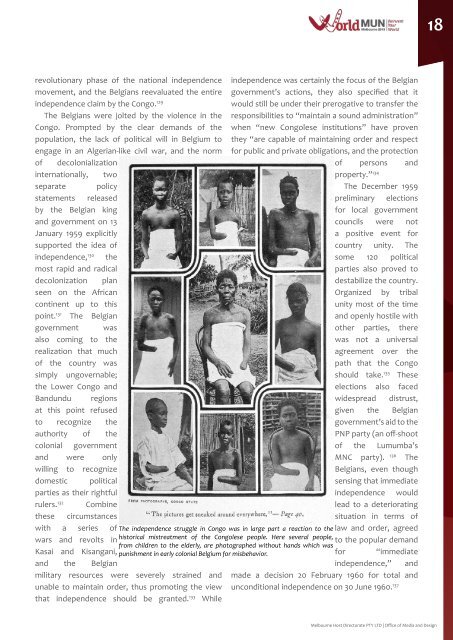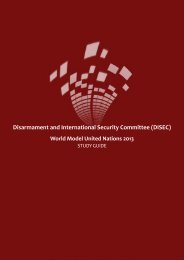Historical Security Council Study Guide - World Model United Nations
Historical Security Council Study Guide - World Model United Nations
Historical Security Council Study Guide - World Model United Nations
Create successful ePaper yourself
Turn your PDF publications into a flip-book with our unique Google optimized e-Paper software.
evolutionary phase of the national independence<br />
movement, and the Belgians reevaluated the entire<br />
independence claim by the Congo. 129<br />
The Belgians were jolted by the violence in the<br />
Congo. Prompted by the clear demands of the<br />
population, the lack of political will in Belgium to<br />
engage in an Algerian-like civil war, and the norm<br />
of decolonialization<br />
internationally, two<br />
separate policy<br />
statements released<br />
by the Belgian king<br />
and government on 13<br />
January 1959 explicitly<br />
supported the idea of<br />
independence, 130 the<br />
most rapid and radical<br />
decolonization plan<br />
seen on the African<br />
continent up to this<br />
point. 131 the Belgian<br />
government was<br />
also coming to the<br />
realization that much<br />
of the country was<br />
simply ungovernable;<br />
the Lower Congo and<br />
Bandundu regions<br />
at this point refused<br />
to recognize the<br />
authority of the<br />
colonial government<br />
and were only<br />
willing to recognize<br />
domestic political<br />
parties as their rightful<br />
rulers. 132 Combine<br />
these circumstances<br />
with a series of<br />
wars and revolts in<br />
Kasai and Kisangani,<br />
and the Belgian<br />
military resources were severely strained and<br />
unable to maintain order, thus promoting the view<br />
that independence should be granted. 133 While<br />
independence was certainly the focus of the Belgian<br />
government’s actions, they also specified that it<br />
would still be under their prerogative to transfer the<br />
responsibilities to “maintain a sound administration”<br />
when “new Congolese institutions” have proven<br />
they “are capable of maintaining order and respect<br />
for public and private obligations, and the protection<br />
of persons and<br />
property.” 134<br />
The December 1959<br />
preliminary elections<br />
for local government<br />
councils were not<br />
a positive event for<br />
country unity. the<br />
some 120 political<br />
parties also proved to<br />
destabilize the country.<br />
Organized by tribal<br />
unity most of the time<br />
and openly hostile with<br />
other parties, there<br />
was not a universal<br />
agreement over the<br />
path that the Congo<br />
should take. 135 these<br />
elections also faced<br />
widespread distrust,<br />
given the Belgian<br />
government’s aid to the<br />
PNP party (an off-shoot<br />
of the Lumumba’s<br />
MNC party). 136 the<br />
Belgians, even though<br />
sensing that immediate<br />
independence would<br />
lead to a deteriorating<br />
situation in terms of<br />
law and order, agreed<br />
to the popular demand<br />
for “immediate<br />
independence,” and<br />
made a decision 20 February 1960 for total and<br />
unconditional independence on 30 June 1960. 137<br />
The independence struggle in Congo was in large part a reaction to the<br />
historical mistreatment of the Congolese people. Here several people,<br />
from children to the elderly, are photographed without hands which was<br />
punishment in early colonial Belgium for misbehavior.<br />
18<br />
Melbourne Host Directorate PTY LTD | Office of Media and Design
















